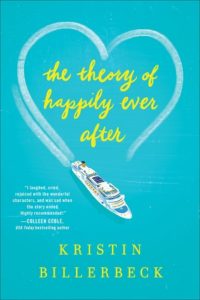Christian Chick Lit author Kristin Billerbeck is the award-winning author of several novels. Her latest, The Theory of Happily Ever After (Revell), follows an unhappy intellectual as she sets out to disprove the theory that smart women can’t be happy. In this interview, Kristin shares the true-life inspiration for her main character, where she got the idea for the conflict, and why she likes writing about heroines who choose the wrong men…
In your novel, Dr. Maggie Maguire is an unhappy person trying to teach others how to be happy. How did you come up with this character?
 I have a strange fascination with neuroscience books. After reading one of these books, one scientist struck me as interjecting her own emotions into the science. It seemed really odd compared to the other scientific-based books I’d read on the brain.
I have a strange fascination with neuroscience books. After reading one of these books, one scientist struck me as interjecting her own emotions into the science. It seemed really odd compared to the other scientific-based books I’d read on the brain.
Not long after that, I met a happiness researcher at a funeral. I know—the irony! She was such a flatlined personality and it seemed like such great comedy to have a happiness researcher who seemed truly miserable.
Dr. Maggie developed from these encounters. I wanted to explore the question, why are people, who seemingly have it all, so miserable? As Christians, we know the answer, but I still wanted to explore this question a bit more.
When a handsome stranger claims “smart women can’t be happy,” Maggie sets out to disprove him—which seems like a great setup for a romantic comedy. What inspired this conflict?
I was living in Silicon Valley and seeing how many brilliant people, who seemingly have it all, are quite miserable in their day-to-day activities. Whereas, when I’d visited my parents in the country, people seemed friendlier and happier. It made me wonder, are smarter people more miserable? So my hero asked the question and the conflict was born.
What do you consider the essential qualities of a heroine?
 For my heroines, I love a strong, smart, but misguided heroine who has to rethink her original assessment of a situation. I prefer a woman who thinks she understands something, but then life shows her the other side and she has to recalibrate. Heroines like Elizabeth Bennet–who was wrong about Mr. Darcy (Pride and Prejudice); Scarlett O’Hara, who was very wrong about Ashley Wilkes (Gone with the Wind) and Bathsheba Everdene who missed the mark on Gabriel Oak (Far from the Madding Crowd).
For my heroines, I love a strong, smart, but misguided heroine who has to rethink her original assessment of a situation. I prefer a woman who thinks she understands something, but then life shows her the other side and she has to recalibrate. Heroines like Elizabeth Bennet–who was wrong about Mr. Darcy (Pride and Prejudice); Scarlett O’Hara, who was very wrong about Ashley Wilkes (Gone with the Wind) and Bathsheba Everdene who missed the mark on Gabriel Oak (Far from the Madding Crowd).
What do you hope readers come away with after reading The Theory of Happily Ever After?
I hope they have a fun beach read and perhaps look into their own lives and see where they might have judged a situation poorly and might have more empathy and compassion. Understanding someone’s painful history can give us a glimpse into their mistakes.
Why did you decide to write romance novels?
I grew up on a steady diet of Jane Austen. I fell in love with Mr. Darcy from Pride and Prejudice at an early age and loved the drama mixed with social commentary. I never missed a Masterpiece Theatre on Sunday nights in high school, so story was an early love language for me. Writing romance seemed like the natural route for someone like me. I don’t like to dwell on anything negative, and I believe life should always have a happily ever after.
What are the best ways that readers can support their favorite authors?
If they enjoy an author, tell a friend—either on social media or in person. Word-of-mouth is still the best salesperson. With self-publishing and traditional publishing, there are more books than ever so it’s very hard for an author to get their books on the shelves.
Also, if a favorite author has a book signing or an online book club, join in the fun. You’ll probably meet like-minded readers and have fun while you’re at it.
Visit Kristin Billerbeck’s author page:
https://www.familyfiction.com/authors/kristin-billerbeck
The Theory of Happily Ever After
Kristin Billerbeck
Revell


